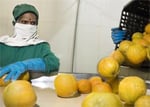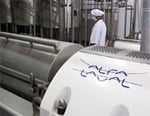A fruitful enterprise
After pioneering drip irrigation in India, where it has a 50 percent market share, Jain Irrigation Systems registers strong growth in food processing.
DATE 2023-11-28 AUTHOR R F Mamoowala “Give us a piece of land that is barren, and we can make it a lush green, provided there are enough resources and will power,” says Bhavarlal H Jain, chairman of Jain Irrigation Systems, waving at the green campus of the 700-acre Jain Hills headquarters in Jalgaon city, about 400 kilometres east of Bombay. “That was the case with this land. It was once a dry, rocky, mountainous region.”
“Give us a piece of land that is barren, and we can make it a lush green, provided there are enough resources and will power,” says Bhavarlal H Jain, chairman of Jain Irrigation Systems, waving at the green campus of the 700-acre Jain Hills headquarters in Jalgaon city, about 400 kilometres east of Bombay. “That was the case with this land. It was once a dry, rocky, mountainous region.”
The farmers in this high-yielding banana belt are beholden to him for having brought them a value-added integrated agricultural system that includes training, water and soil analysis, optimization of water resources through drip irrigation, and tissue culture.
Jain Irrigation is an integrated agricultural company that in addition to providing drip irrigation systems and components is into food processing, plastics, PVC, polyethylene and polypropylene piping systems, plastic sheets, tissue culture and solar energy. Jain, the son of a “farmer and a petty trader in cotton,” has not forgotten his agricultural roots.
At the heart of the group’s operation is an agri-research centre in Jalgaon where farmers get first-hand experience with modern technology in water and soil management, tissue culture and more. They return armed with knowledge and technology and the likelihood of doubling their yields.
Jain is a lawyer by education, but he says his heart has always been in business. He inherited farmland from his father in the early 1960s, and as he tended the land he began trading. His seed capital was 7,000 rupees (USD 1,000).
In 1985, while attending an international trade fair in the United States, Jain saw how drip irrigation could result in huge water savings. Through technical collaboration he gradually transferred the technology to farmlands in India. Today he is the largest player in this field, with a 50 percent market share.
Jain’s venture into fruit and vegetable processing came with a plant he set up in Jalgaon around 1995. Then came five years of difficult times as the company weathered the general economic downturn. “We have now started making money and are the largest processors of fruits and vegetables in India, with a market share over 15 percent,” says Jain.
100,000 mango trees
 In 2006-2007 Jain’s food processing business handled 200,000 tonnes of fruits and vegetables, with fruit processing – pulp, pulp concentrates, clarified juice and juice concentrates – comprising 100,000 tonnes. Tomato puree and dehydrated onions form a chunk of its vegetable processing business, with the latter being totally exported. “This year we should be able to handle over 300,000 tonnes,” says Jain.
In 2006-2007 Jain’s food processing business handled 200,000 tonnes of fruits and vegetables, with fruit processing – pulp, pulp concentrates, clarified juice and juice concentrates – comprising 100,000 tonnes. Tomato puree and dehydrated onions form a chunk of its vegetable processing business, with the latter being totally exported. “This year we should be able to handle over 300,000 tonnes,” says Jain.
The company’s association with Alfa Laval began after the fruit processing plant was set up. “The first job they did for us was the automated fluid-handling system with pumps, valves and piping of the fruit factory,” recalls Jain. “In 1996 it was very difficult to get an international-standard piping job done in India. We selected Alfa Laval, and I’d like to put on record our deep appreciation for their service, particularly in meeting international standards.”
Jain has continued to purchase fruit processing equipment from Alfa Laval. “In mango and papaya processing we use their decanters for removing black specks,” says Jain. “We also use the decanters to remove grit in guavas and for processing other fruits, too.” At Jain Hills there are 100,000 mango trees, including 30,000 Alphonsos (considered the king of mangoes), planted over 1,000 acres.
Currently, Jain Irrigation exports its processed fruits, vegetables and other products to 130 countries, with the US and Western Europe being the dominant markets.
Jain sees a bright future for the processed food industry in India. No other country can match India’s wide range and profile of fruits – pomegranate, guava, mango, custard apple, banana and other tropical fruits, he says, adding that 60 percent of the world’s mangoes are produced there. “Others have no chance in this fruit,” he says. “They have been trying for 30 years to duplicate the Alphonso, but have failed.”
Minimal water, steam and power consumption
 At Jain’s state-of-the art Jalgaon food processing plant the new season has just begun for crushing pomegranates – the plant can handle up to 600 tonnes of pomegranate per day – and a pilot project is on for making sweet lime concentrate for a global food major.
At Jain’s state-of-the art Jalgaon food processing plant the new season has just begun for crushing pomegranates – the plant can handle up to 600 tonnes of pomegranate per day – and a pilot project is on for making sweet lime concentrate for a global food major.
Business unit chief Sunil Deshpande explains the company’s environmental policy: “Currently, all the water we use comes from water harvesting, and nothing goes out from these premises. The water is recycled and goes back to our farm, as does the solid waste after it is converted into bio fertilizer. On the anvil is a power plant using agricultural and food plant waste to generate electricity and bio fertilizer.”
Deshpande says that the company now only looks at equipment that consumes minimal power and steam while giving better output and meeting safety and environmental standards. The Alfa Laval evaporator used for juice concentration fits these criteria, he says, noting: “In the evaporator we had been using since 1998, we used one kilogram of steam to evaporate a litre of water. But with the Alfa Laval evaporator we need to use only 0.3 kilogram of steam [per one litre of water], providing a two-thirds savings.
The entire economics of this food processing operation is based on how much steam you consume. Since we use heavy fuel oil, a scarce resource thanks to rising oil prices, we have to be competitive, and the equipment has to be energy efficient.”
Halved processing cost
The Alfa Laval evaporator has the capacity to handle 7,500 litres of fluid per hour. “We can run mango, guava, pomegranate, orange and sweet lime juice on it,” Deshpande says. “The holding time is low, so the quality of the end product is good. It is fully automatic and trouble free.”
Jain adds that the right technology can cut about half of the processing cost. A challenge is the high price of fuel oil used to create steam. “But we are now trying to get into bio energy for this purpose, maybe through bio gas, and that will give us an advantage over others.”
For the present, though, next to drip irrigation, Jain says, food processing will be the mainstay of the company’s operations. “Food requirements are going to increase as living standards improve, particularly in developing countries, and there will be more demand for processed food,” he says.
Jain explains that while the entire company has grown over five years at a compounded rate of 42 percent, nearly five times India’s average GDP growth rate, the fruit and vegetable processing business has grown at 60 percent over three years.
Jain’s vision is to make it “a billion-dollar company within three years.” Sales in 2006–2007 from Indian operations alone were around INR 12 billion (USD 300 million). “This year [2007–2008] the company is targeting INR 18 billion [USD 450 million],” Jain says. “This will be achieved largely through organic growth, but a part of it will come through acquisitions.”
Embracing new technology
Alfa Laval began its association with Jain Irrigation Systems in 1995 with products such as pipes, sanitary valves, fittings and pumps for transferring juice and pulp.
The first Alfa Laval evaporator was commissioned at the Jain Irrigation food processing plant in Jalgaon in 2006. “An evaporator is used specifically for concentrating heat-sensitive products like pomegranate up to 65 Brix,” says Vijay Galgali, Alfa Laval’s branch manager in Pune, India. “Because of the versatile design of the evaporator, Jain uses it for concentrations of such fruits as mango, tomato and sweet lime.”
Earlier Jain Irrigation used a conventional evaporator, before buying Alfa Laval’s plate evaporator with the Alfavap and Alfacond technology, explains Galgali. The plate evaporator helped the company to get better-quality products with more flexibility in operation, maintenance and installation costs.
The company has bought 11 Alfa Laval decanters, which work, he says, “like a magic box in terms of removal of black specks from mango pulp.” This has helped Jain get better-quality pulp as well as reduced labour time for manual slicing and inspection of mangoes, improved plant hygiene (because less manpower is required), lower operational costs and improved yields.
Company chairman Bhavarlal H Jain says he is delighted with Alfa Laval’s service. “Their response to the needs of the customer has been exemplary,” he says. “Their decanters were delivered, installed and commissioned on time, and whenever we needed any help, they were always there for us.”
Though there was a hiccup in the timely commissioning of the evaporator, its functioning has been smooth. “It is of excellent quality and on par with any international equipment – American, Italian or German,” Jain says. “It is reliable and energy efficient, and it can deliver up to the weighted capacity or even better. It is virtually maintenance-free, and we are able to make high-quality end products with it.”
